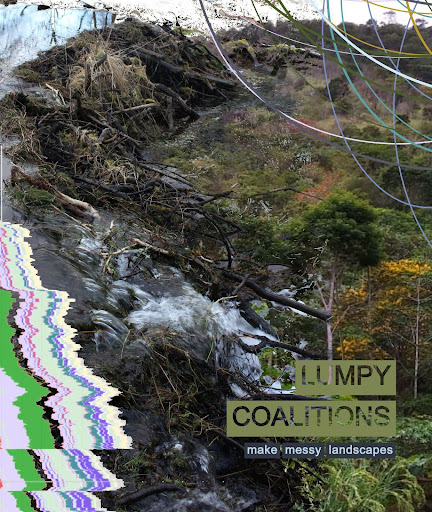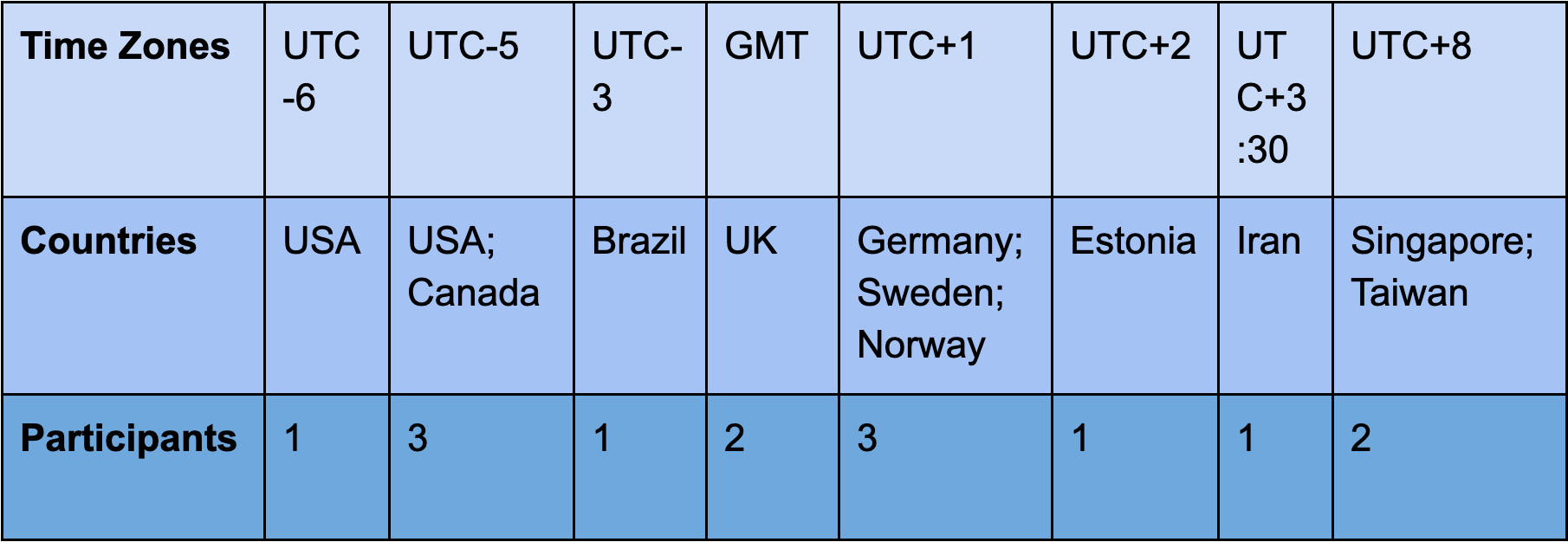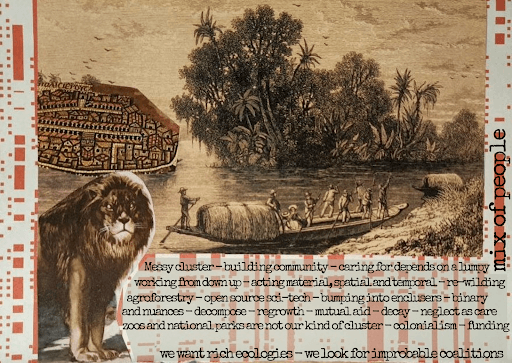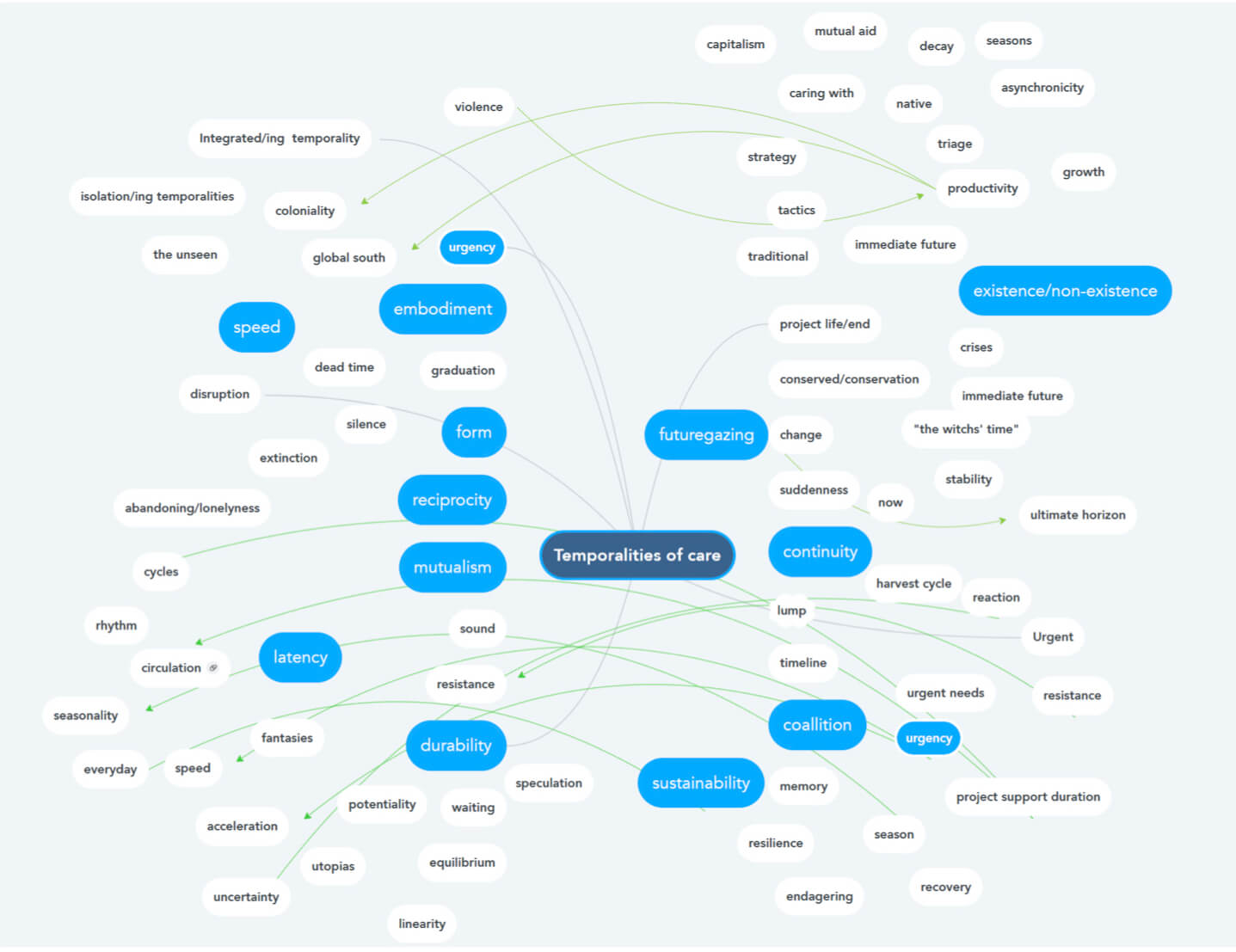Temporalities of Care in Conservation Environments: A Workshop Report
Marleen Boschen, Franziska Dahlmeier, Naomi Hammett, Emilie Köhler, and Markus RudolfiMay 16, 2022 | Report-Backs

Figure 1: Lumpy Coalitions: Page taken from zine contribution titled “Lumpy Coalitions” by Edda Starck, Mariana Cruz A. Lima & Ross Dalziel.
What types of temporality are needed in order to enable less harmful entanglements within ecologically troubled more-than-human worlds? This question lay at the heart of our workshop ‘Temporalities of Care in Conservation Environments’ which we organized in January 2022, funded by the Center for Science Studies at Lancaster University. Inspired by scholars who believe tales of coming ‘crisis’ have helped stabilize destructive conditions rather than hinder them (Masco, 2017; Puig de la Bellacasa 2017), we aimed at empirically mapping those kinds of temporalities that enable relations of care within the multiple ecological field sites of our participants.
Fittingly, the organisation of our workshop had us spending many hours “converting time”: the 14 registered participants’ locations spanned over 14 hours of time difference – from UTC-6 to UTC+8. To handle this temporal complexity we chose to create a handbook that functioned as a coordinating device. In a way, the workshop title, “Temporalities of Care”, turned back on us and asked us to “care for temporalities”.

Figure 2: Chart stating locations and time zones of workshop participants.
Structured over four days in January 2022, the workshop days ended and began for some in the mornings, for others late at night. For the first and the last day all workshop participants gathered via Zoom, the two days in-between allowed participants to work in smaller groups to explore resonances and divergences in how temporalities of care surfaced in their field sites. These synchronicities and asynchronicities started to give a sense of the many temporalities the workshop sought to bring in relation to each other. Throughout the two synchronous workshop days there were moments when other temporalities of care seeped into our shared space: the urgency of responding to shifting childcare arrangements and sudden emergencies, bodily fatigue of attending a workshop late at night or very early, and self-care of participants at a time when many parts of the world were experiencing the COVID-19 Omicron wave. It was a reminder of the often invisibilized forms of care and their temporalities that always accompany research practices. Our workshop departed from established formats to make these forms of care a constitutive part of our gathering and to allow them to actively shape our dialogues and group activities.
We began the event with short introductions of our participants’ field sites, bringing together a diverse range of conservation practices from seed houses in Colombia to marshland restoration in Iran. In this process, common questions emerged, such as ‘how to represent the more-than-human properly?’ or ‘how to care for something that is imperceptible to human senses?’
This first synchronous meet-up included an introduction to the concept of ‘rough relationing’ – an analytical method where time is not seen as linear and singular but as always part of a collective effort of ordering knowledge, thereby producing workable analytic tensions. We offered rough relationing as a possibility to analytically bridge the various projects assembled in the workshop. Based on their fieldwork experiences, we encouraged our participants to propose time categories they saw emerging in their materials. The first day concluded with an inspiring keynote lecture by feminist STS scholar Dr. Juno Salazar Parreñas (Cornell, US) titled Care at What Cost? Contemporary Wildlife Conservation and Recursive Racisms. In her talk, Parreñas shared insights of her latest fieldwork focussing on retired lions in South Africa and the interconnections between care, violence, and racism within conservation settings. Temporality showed up here in the form of colonial pasts – specifically the unjust allocation of land into the hands of former colonizers – to conserve wildlife while yet again dispossessing indigenous people of their homelands. In this way it can be seen that environmental presents are leaden with violences and tensions inherited from a colonial past (that has never really ended).

Figure 3: Page taken from zine contribution titled “Lumpy Coalitions” by Edda Starck, Mariana Cruz A. Lima & Ross Dalziel.

Figure 4: Page taken from zine contribution titled “Dissonant Temporalities of Care: Survivability in Evolution, Seed Saving, and Natural Products Research” by Daphné Esquivel-Sada, Alberto E. Morales & Nathalia Hernandez Vidal.
Sharing what they had discussed during the previous two asynchronous workshop days when participants had worked together in four small groups, the second synchronous meeting included presentations of beautiful and thought-provoking collages, diagrams, and writing experiments putting each group’s field sites in relation to each other. The first presentation explored how particular temporalities of slow fieldwork turn the production of knowledge into a practice of care. The second group focused on what they termed ‘lumpy coalitions’ – a provisional gathering of different entities all with their own temporal rhythms, coalescing nonetheless. Latency emerged as the shared theme of the third group who addressed how different forms of waiting and coming into visibility exist within varied conservation settings. The last group centered questions of marginalization not just in the treatment of more-than-humans in conservation practices but of marginalized people as well, resonating with Parreñas’ provocation on the embeddedness of racism within conservation projects. They suggested a sensibility towards conservation projects as never free of conflict. We tried to hold all these relations in a mind map that gathered concepts from across the groups (Fig. 5).

Figure 5: Mindmap “Temporalities of care”, co-created by all workshop participants.
After the workshop, the groups developed contributions for a zine, where engagements with different field sites are connected through categories of time and care and presented in playful visual and textual formats. We see the zine as a rhizomatic endeavour (Choy et al. 2009) decentring authors and texts whilst acknowledging the underlying collective effort involved. In the future, the workshop will be carried on to the EASST 2022 conference in Madrid, where workshop organizers and participants present the zine and tell disruptive stories about possible multispecies futures.
To find out more about the details of the participants’ contributions, the workshop and the ConsCare Network via which we as workshop organizers came together, please visit https://conscare.hypotheses.org/zine-contributions.
References:
Choy, T.; Faier, L.; Hathaway, M.; Inoue, M.; Satsuka, S.; Tsing, A. (2009): A new form of collaboration in cultural anthropology: Matsutake worlds. In: American Ethnologist. Journal of the American Ethnological Society 36 (2): 380-403.
Masco, Joseph (2017): The Crisis in Crisis. In: Current Anthropology 58 (15): 65-76.
Puig de la Bellacasa, Maria (2017): Matters of Care. Speculative Ethics in More-Than-Human Worlds. Minneapolis: University of Minnesota Press.
_____________________________________________________________________________
Marleen Boschen is a PhD candidate and associate lecturer in Media, Communications and Cultural Studies at Goldsmiths, University of London. In her research she is looking at seed banking practices from global seed vaults to grassroots organisations as ecological imaginaries for speculative futures.
Franziska Dahlmeier is a sociologist and PhD researcher at Hamburg University. Among her research interests and expertise are feminist STS, multispecies ethnography, practices of care and control within more-than-human worlds as well as the interlacement of ‘artificial’ and ‘natural’ ecologies (such as botanic gardens).
Naomi Hammett is a PhD candidate in Sociology at Lancaster University. Her doctoral research is an investigation of practices on dairy farms in North West England relating to cows, carbon and the environment.
Emilie Köhler is a PhD student in the project Rewilding the Anthropocene at the University of Cologne. In her research she investigates how tracking technologies reshape transboundary elephant conservation in the Kavango-Zambezi Transfrontier Conservation Area and how these processes enfold on the ground.
Markus Rudolfi is a sociologist at Goethe University Frankfurt, Germany, working in the area of interpretive social research. His PhD is an ethnography which focuses on the Bavarian Forest/Šumava transboundary protected area and asks about forms of scientific collaborations along selected case studies.
Published: 05/16/2022
